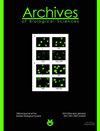两种长链非编码rna CAT179和CAT 1796可以区分前列腺增生和前列腺癌
IF 0.8
4区 生物学
Q4 BIOLOGY
引用次数: 2
摘要
近年来,一些长链非编码rna (lncRNAs)成为癌症生物学中潜在的生物标志物。在本研究中,我们检测了四种lncrna (CAT179、CAT1796、PRCAT47和CAT1066)的表达,以评估它们区分前列腺肿瘤和良性前列腺增生(BPH)的能力。在20例前列腺癌和20例良性前列腺增生(BPH)样本以及11例前列腺增生和11例前列腺癌样本中检测了这4种lncRNAs的表达。提取总RNA用于cDNA合成。采用实时荧光定量PCR (qRT-PCR)检测候选lncrna的表达情况。lncRNAs CAT1796和CAT179在前列腺癌中与BPH临床样本相比均上调(P<0.05)。ROC曲线分析显示,CAT1796对前列腺癌的诊断具有较高的敏感性和特异性(AUC=0.8151[95%CI 0.65-0.97]),提示CAT1796 lncRNA可能是前列腺癌的生物标志物。本文章由计算机程序翻译,如有差异,请以英文原文为准。
Two long non-coding RNAs, CAT179 and CAT 1796, differentiate between benign prostate hyperplasia and prostate cancer
Several long non-coding RNAs (lncRNAs) have recently emerged as potential biomarkers in cancer biology. In the present study, we examined the expression of four lncRNAs (CAT179, CAT1796, PRCAT47, and CAT1066) to evaluate their ability to discriminate prostate tumors from benign prostate hyperplasia (BPH). Expression of these four lncRNAs was examined in 20 prostate cancer and 20 benign prostate hyperplasia (BPH) samples, as well as in urine samples (11 BPH, and 11 cancer). Total RNA was extracted for cDNA syntheses. The expression of the candidate lncRNAs was evaluated by quantitative real-time PCR (qRT-PCR). The lncRNAs CAT1796 and CAT179 were both upregulated in prostate cancer compared to BPH clinical samples (P<0.05). ROC curve analysis showed that CAT1796 had high sensitivity and specificity for diagnosis of prostate cancer (AUC=0.8151[95%CI 0.65-0.97]), suggesting that CAT1796 lncRNA could be a prostate cancer biomarker.
求助全文
通过发布文献求助,成功后即可免费获取论文全文。
去求助
来源期刊
CiteScore
1.40
自引率
0.00%
发文量
25
审稿时长
3-8 weeks
期刊介绍:
The Archives of Biological Sciences is a multidisciplinary journal that covers original research in a wide range of subjects in life science, including biology, ecology, human biology and biomedical research.
The Archives of Biological Sciences features articles in genetics, botany and zoology (including higher and lower terrestrial and aquatic plants and animals, prokaryote biology, algology, mycology, entomology, etc.); biological systematics; evolution; biochemistry, molecular and cell biology, including all aspects of normal cell functioning, from embryonic to differentiated tissues and in different pathological states; physiology, including chronobiology, thermal biology, cryobiology; radiobiology; neurobiology; immunology, including human immunology; human biology, including the biological basis of specific human pathologies and disease management.

 求助内容:
求助内容: 应助结果提醒方式:
应助结果提醒方式:


